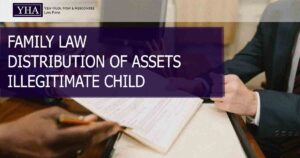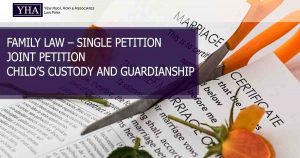
FAMILY LAW – ADULTERY AND MAINTENANCE
Adultery is a legal ground for divorce. However, complication arises in proving adultery. This legal update covers proof and effect when adultery is proven as well as maintenance of wife and children.
法律资讯

Adultery is a legal ground for divorce. However, complication arises in proving adultery. This legal update covers proof and effect when adultery is proven as well as maintenance of wife and children.

A had mistress and a wife; both of whom had given birth to a child each. A died without a will. Can the child of the mistress be entitled to succeed and inherit A’s property under the Distribution Act 1958?

Can an ex-spouse be entitled to additional maintenance after a Decree Nisi has been ordered by the court?

Are customary marriages valid in law?

Is it possible for one to commence divorce proceeding against their spouse on the grounds of adultery?

Can you compel your partner, who refuses to acknowledge paternity, to undergo a DNA Test?

Legal Updates – Family Law – Single Petition – Joint Petition – Child’s Custody and Guardianship
Medical insurance premiums do not increase gradually. They rise exponentially. For many years, costs appear manageable, giving policyholders a false sense of stability. However, once the insured reaches their mid-60s, medical charges begin to accelerate sharply, and after age 70, they often outpace the premiums by several multiples.
This happens because medical insurance is funded from a finite pool of money – an investment “bucket” – while the medical rider functions like an engine that consumes more fuel as the insured ages. When the engine grows faster than the bucket can be replenished, depletion is inevitable. The result is sudden premium hikes, demands for top-ups, or policy lapse – not due to misconduct or missed payments, but due to the structural design of the product itself.
Consumers must stop relying on what insurance agents say and start reading what insurance policies actually provide. ‘Medical cover until 99’ does not mean guaranteed coverage at an affordable premium. In reality, medical insurance charges rise exponentially after age 70, often making the policy mathematically unsustainable. By the time policyholders realise this, they are told to top up tens of thousands of ringgit or lose coverage altogether.
In JMB Kelana Square v Perantara Properties Sdn Bhd & Ors [2025] 12 MLJ 51, the High Court held that a developer who received compensation for land compulsorily acquired for the LRT 3 project could not retain sums attributable to common property. Although the compensation was paid entirely to the developer as registered proprietor, the Court found that part of the acquired land constituted common property, and the developer therefore held RM6.05 million on constructive trust for the Joint Management Body. The decision affirms that JMBs have proprietary standing to recover compensation for common property and that courts will intervene to prevent unjust enrichment in strata developments.
In Aerodarat Services Sdn Bhd v Lawerance Raj a/l Arrulsamy & Anor [2025] 11 MLJ 26, the High Court dismissed an employer’s judicial review and affirmed that prolonged medical leave does not, by itself, amount to misconduct justifying dismissal. The Court held that the employer failed to prove the critical element of intention not to return to work or unwillingness to perform contractual duties, despite high absenteeism caused by serious illness and surgery. The ruling reinforces that employers must distinguish between genuine illness and misconduct, and cannot rely on medical absence alone to terminate employment.
In Kong Kin Lay & Ors v Kong Kin Siong & Ors [2025] 5 MLJ 891, the Court of Appeal set aside a will executed by a 97-year-old testator, holding that there was real doubt as to testamentary capacity, compounded by serious suspicious circumstances and undue influence by certain beneficiaries. The Court emphasised that while the “golden rule” is not a rule of law, failure to obtain medical confirmation of capacity where doubt exists is a grave omission. Credibility issues with the drafting solicitor, beneficiary involvement in the will’s preparation, and suppression of evidence led the Court to declare the will invalid and order intestacy.
In KSY Juice Blends UK Ltd v Citrosuco GmbH [2025] 2 Lloyd’s Rep 581, the UK Court of Appeal held that a long-term supply contract was not unenforceable merely because part of the price was stated as “open price to be fixed”. The Court implied a term that, in the absence of agreement, the price would be a reasonable or market price, noting that the product’s value could be objectively benchmarked against the market price of frozen concentrated orange juice. Emphasising that courts should preserve commercial bargains rather than destroy them, the decision confirms that section 8(2) of the Sale of Goods Act 1979 operates as a saving provision, not a bar to enforceability.